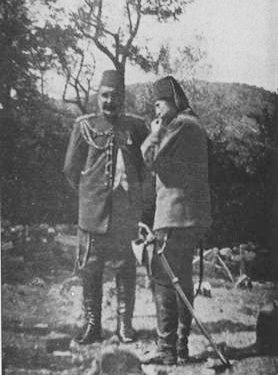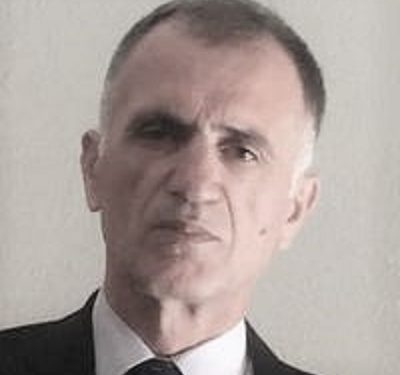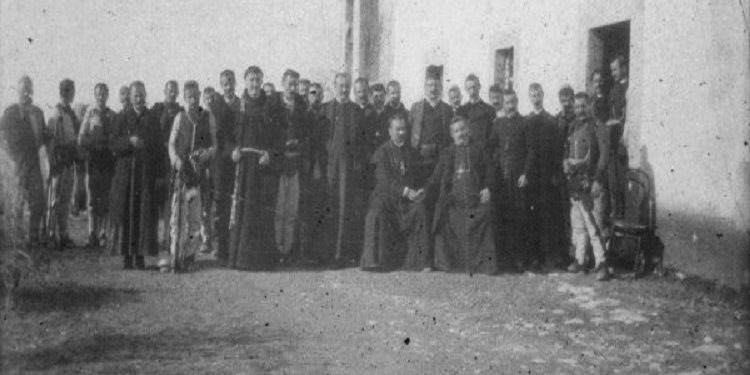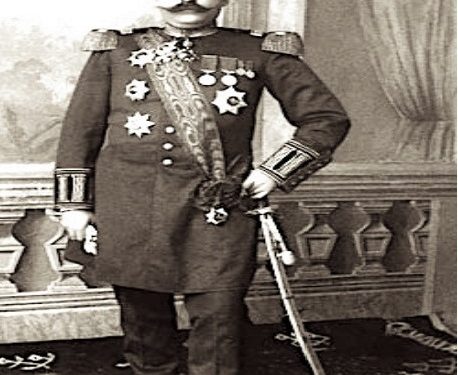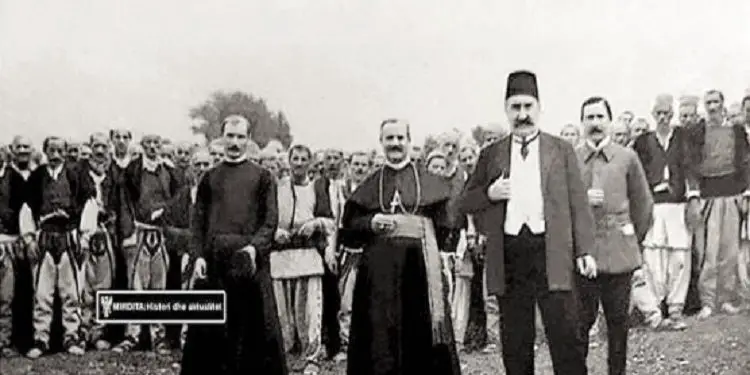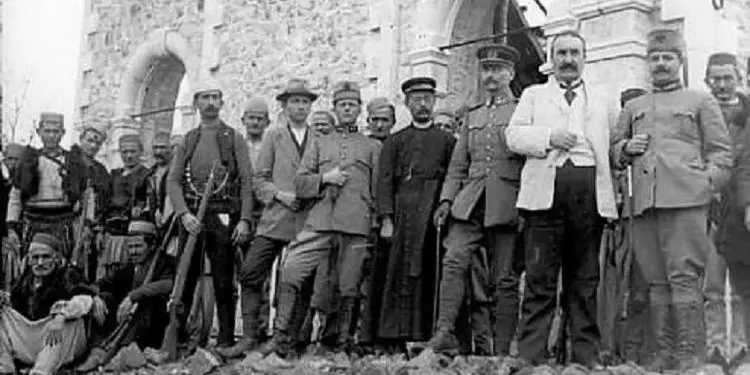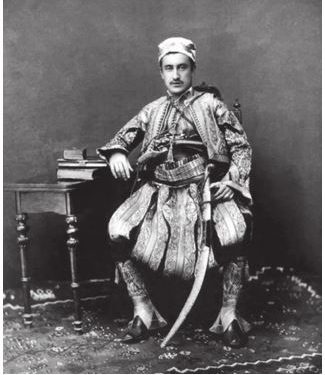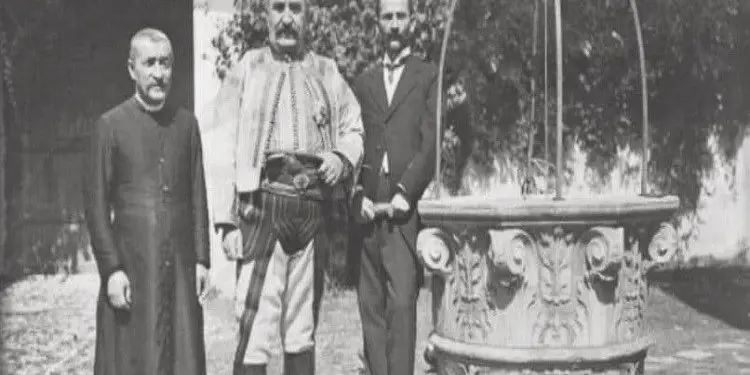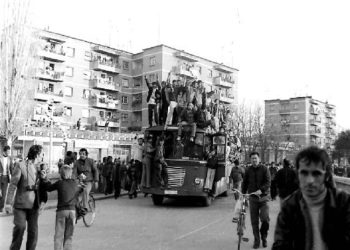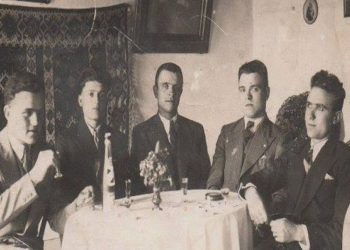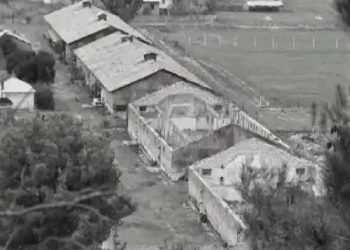By Dr. Nikol Loka
Part seventeen
“PRENGA BIBE DODA, THE SHADOWS OF A CITIZENSHIP”
Memorie.al / The newest book “Prengë Bibë Doda, a phenomenon in Albanian political life”, by researcher Nikollë Loka, not only expands the scope of historical studies on Mirdita, the Door of Gjonmarkaj and the figure of the Mirdita Prince, Prengë Bibë Doda, but it is also a contribution to national historiography. The very rich archival material, the literature used or consulted, oral traditions, etc., make this book a real study treasure, giving the science of history a scientific monograph that enriches our knowledge of Mirdita, its captains, tradition, history etc. To study such an important and complex figure, as the figure of Prengë Biba Doda, is a high scientific responsibility that not everyone undertakes. Nikollë Loka, has done a great job of research and treatment by the professional researcher, giving us the portrait of the Prince and the general Mirditor, with the true contours. Dr. Loka has adhered to the end of the space and time, in which the multidimensional events and their protagonists have developed.
THE MONOGRAPH “ABOUT BIBË DODA, A PHENOMENON IN ALBANIAN POLITICAL LIFE”, A VALUABLE SCIENTIFIC STUDY THAT ENRICHS THE FUND OF OUR HISTORICAL STUDIES
(By Mr. Sc. Murat Ajvazi, March 2017, Switzerland)
Continues from last issue
Principality of Mirdita, in three different times
The idea of the Catholic Principality of Mirdita was not the creation of Prenga or his father, Bibë Doda, although they both had tried to realize that project, through two armed uprisings that broke out in Mirdita. They were a group of young intellectuals, like; Zef Jubani, Pashko Vasa, Gaspë Krasniqi, Pal Dodmasej, etc., who were influenced by the circumstances created in the country and by movements for national liberation in other countries, judged the situation ripe for an anti-Turkish uprising in that province .
According to Shkodra intellectuals, Bibë Doda should have been the first to raise the flag of the uprising and declare an autonomous, or independent Albanian principality, around which other provinces of the country would unite. The uprising that was supposed to break out in Mirdi, would then spread to other provinces as well. (342)
Prengë Bibë Doda was also under the influence of these intellectuals. He, in the absence of a compromise with the Ottoman authorities, intended to declare the Principality of Mirdita and place the High Gate before the fact. The Mirdita uprising of 1876-1877 had as its motive the creation of this Principality.
But a series of agreements that were signed in this period, between the Ottoman Empire and the Great Powers, put before the Albanians the task of protecting the entirety of their lands and in those conditions, the problem of the “Principate” no longer had the former value . The events evolved quickly and in the first plan, the task of preserving the Albanian lands, and even the efforts for the autonomy of the whole of Albania, in the framework of the four vilayets, emerged. Despite the fact that the Albanians had mobilized for the protection of the country’s territorial integrity, the leaders of Mirdita and the surrounding areas officially demanded the creation of the “Catholic Principality of the North”. The request for a Principality in Northern Albania was sent to the Congress of Berlin.
It seems that Prengë Bibë Doda took this decision in the conditions when he and the Mirditas’ hostility towards the Turkish authorities was great. Mirdita had just come out of a war with the Ottomans and had not realized its demands, therefore, what they could not do with weapons, the Mirdita leaders hoped to achieve through diplomacy. On June 18, 1878, the leaders of Mirdita, Puka, Kthella, Malësi e Lezha and Lura addressed the plenipotentiaries of the Great Powers at the Congress of Berlin, with the request for the recognition of traditional autonomy, as well as the recognition of the right to create an autonomous state, of an autonomous Principality.
“We, the undersigned, chiefs and elders of Mirdita, Puka, Ohrid e Voghe, Malėšė di Lezha, beg … that honorable consulate, to have the kindness to transmit and present to the gentlemen as soon as possible plenipotentiary at the European Congress in Berlin, our plea is as follows: our countries, as is well known, have always been regulated and governed by their own laws, and have consequently, in fact, enjoyed autonomy. Therefore, we pray that this autonomy is officially recognized by the Great European Powers and Puka, Ohri i Vogel (Kthella), the Highlands of Lezha and Lura, join Mirdita and remain under the immediate and direct command of our president dear, natural and heir, Prengë Bibi Doda. Our countries, from time to time, have shown the common desire to form a recognized autonomous state, alone with Mirdita, and a special testimony are the facts that happened two years ago, so we hope that our aspirations, which we so much desire, will be taken into account and will have the approval of the all-powerful masters, at the Congress of Berlin…! With confidence that the honorable consulate will have the kindness to give a strong and fast support to this prayer of ours, we have the honor to express the feelings of the deepest respect…”!
Mirdita
Lesh Mar Shtiefni, old, Lesh Gjeta, Ndue Lesh Per Ndoj, Per Nikolla, Lesh Marka Ndoka, Gjergj Gjoka, Per Deda head, Per Nikolla, Lesh Marka Preni, Per Gjergji, Kole Ndoka, Perek Kola old, Nikol Nreca head.
Kthella
Llesh Preka head, Nikolle Ggeta, Bush Shuli, Mark Ndue Ggeta head, Bib Gjoka, Gjin Gega, Kros Maca, Geg Deda.
The highlands of Lezha
Geg Preni head, Geg Marku, Jak Ndoi, Kol Toma, Simon Leka head, Prend Nikolla, Dede Paloka, Gjergj Dushi old.
Puka
Pjetër Smaili old, Kola Marashi, Ndue Mar Nikolli, Prenkë Pali kree, Gjokë Gjergji old, Ndrec Preni, Pjetër Mirashi, Kola Rexha.
Lura
Kole Bushi head, Dede Vladi, Selman Reçi, Ali Meria, Hasan Ajazi, Ali Limani elder.
The approval of the autonomy of Mirdita by the Congress of Berlin, at the request of the French Count Saint Vallier, did not meet all the demands of the signatories of the petition. The “Principate” was not created and the problem of Mirdita was raised only within the framework of respecting traditional norms.
With protocol no. 13, the Great Powers violated the vital interests of Albania, because they edited the Albanian national issue only as a problem of its Catholic population and, in a special way, only as an issue of a province, such as the province of Mirdita. (343)
The Congress did not legitimize the union of the bajraks of Puka and Lura, with Mirdita twelve bajraks and traditional poisons; it recognized only Mirdita, five bajraks. (344)
Protocol no. 13, opened the way for Vienna, which had long enjoyed the right of protection of the Catholic population of the Ottoman Empire (cultusprotectorate), to intervene freely in the internal life of Mirdita and turn it into an advanced stronghold of the Adriatic and towards the countries of the Central Balkans. It is the time when Austria sends specialists from various fields to Albania: military, linguists, historians, ethnologists, geologists, botanists, etc., to study various aspects of Albanian life, projecting a perspective of relations, after the departure of the Turks.
There were differences between the desire of Shkodra intellectuals for the Northern Principality under the rule of Prince Prengë Bibë Doda and the goals of Prengë himself. Shkodra intellectuals saw Mirdita only as the core of the future Albanian state, while Prenga himself saw his Principality, first of all, as a Catholic state unit, which would weigh heavily in future developments and which would serve in the realization of his political ambitions, in the game for power. He was interested in remaining an important factor in the political developments expected to take place in the country. In the new conditions, Austria-Hungary was interested in the establishment of an Albanian state, with as many spaces as possible, for which a lot was invested, therefore the project of dividing the Albanian territory, in any form, except against national interests in in general, it conflicted with Austrian and to some extent Italian interests. The Ministry of Foreign Affairs in Vienna, in a telegram to the Austro-Hungarian ambassador in Rome, states that; “Giving further subsidies to Prenga will depend on his attitude towards Austro-Hungarian and Italian politics.” (345) the same attitude would be taken towards Monsignor Doçi, if he would support Prengë Biba Doda, against our intentions”. (346)
In the framework of his political game, K-pidani, with the help of Abbot Doç, had organized an assembly alone, with Catholics in Kallmet, which indicates a prepared step and his separatist positions, which undermined the unity of the future Albania forming a state within a state. “It is to be worried, diplomatic sources from Vienna point out, that the meeting had raised the issue of the King in opposition to Austro-Hungarian intentions. The meeting organized in Kallmet served the interests of Prenga, for the autonomy of Catholic North Albania.
This agitation of Prengë Pasha has caused a counter-movement of the bishops and the other side to erupt, against his efforts to call a national assembly of the Catholics of Northern Albania. Prenga talks about cooperation with the government of Vlora, but that cooperation could be done in a quiet and peaceful way, as it had happened in many provinces of South Albania. Let the Italian side be notified, Monsignor Bianki in Durrës should be notified, so that they take a position against it”. (347)
Prenga, this propaganda, had made it near the English and French members of the International Commission. According to him, “The future Albania should be divided into three provinces, completely autonomous, each with its own governor, connected between them through the person of the Prince. At the head of South Albania, he thinks to be Myfit Bey, of Central Albania, Hamit Bey and of North Albania, Prengë Pasha. Rear Admiral Barry announced that Prengë Pasha and Monsignor Doçi had given this problem a completely identical treatment. (348)
In fact, just a few days later, the Austrian consul in Shkodër speaks well of Prenga’s activity. According to him, “Prengë Bibë Doda, is a unifying figure of Catholics, who seeks the organization of Albanians in the North, following the example of the Albanians in the South, leaving behind the differences. His platform is the recognition of the government by the local authorities and the establishment of governance where it does not work. Prenga had proposed that in Shkodër, or in Lezhë, a committee be formed with representatives from each local administration. Northern Albania, in this way, would be connected with the Provisional Government of Vlora, moving away from the idea of regional governments”. (349)
In less than two years, as long as the political developments related to the organization of the Albanian state, which were interrupted with the beginning of the First World War, the idea of the “Principate of the North” from a patriotic project, turned into a dangerous project, that helped the neighboring chauvinist circles, who wanted to divide the country. The time had come to work for independent Albania.
Prengë Bibë Doda’s persistence, even in that situation, to secure a privileged status for Mirdita and the surrounding provinces, proves that he still prioritized narrow interests and that he was not yet ready to enter the national political scene , with a completely patriotic vision, to help the liberation of Albanians from the Ottoman yoke. The Great Powers, and especially France, gave a moral support to Prenga, because his preferential relations, with the French Government, were not conditioned by any conjuncture of the case, but had their roots, in the long tradition of the care of the French state, for the family of Bibi Doda.
Parisi was interested in Prengë Bibë Doda, to be appreciated and helped, to become an important factor in Albanian politics. This can also be seen in the formal respect that the French had for Prenga, in the protocol evaluation they gave him, etc. With the title “Prince”, he was addressed to the high French authorities, in the official correspondence that he had on July 5, 1913, when they informed him of the date and time of the meeting with the President of the Republic of France. (350)
Prenga had also met with Prime Minister Poincare and Foreign Minister Pizhon, who supported the idea of creating the “Catholic Principality of the North”, under the protection of France. (351)
The project of the “Catholic Principality of the North” convinced the Albanian patriots that in the difficult path of the unity of the nation, Mirdita and Prengë Bibë Doda could not be overlooked, because later events showed that with the real assessment of his contributions, he became a determined fighter for the unity of all Albanians and an important factor in political life in Albania.
Between the Young Turks and the insurgents
After the outbreak of the Young Turk revolution, there was talk of Prengë Biba Doda’s return to the Motherland. It didn’t take long for him to come. His arrival was an event for Mirdita, Shkodra, and beyond. Father Pal Dodaj, in his diary, writes: “On the evening of September 18, 1908, Prengë Bibë Doda arrived in Shengjin. As soon as the Prince set foot on the pier, he kissed the ground and made the cross. The mountaineers of Rrenci Mountain came down from Kodra e Nuseve and Pylli i Nave, to greet him. We returned the prince; he left for his palaces in Shkodër.
The long line of people, facing the road; Shëngjin-Shkodër, there was no rupture. Everyone greets him with heart and hand. At the bridge of Bahçalek, the city’s military band, followed by various officers, accompanied him in a triumphal march to his headquarters. In the demonstration of sympathy for Preng Pasha, the Provincial, Loro Mihačevič, Father Gjergj Fishta, Father Pashk Bardhi, Father Ndue Nikaj and representatives of the Jesuit Fathers also came out. (352)
The Franciscan provincial, in his diary, gives us a lot of valuable information about the arrival of Prenga in his country, so it is of interest to give some part of it.
“With great emotion, Prenga’s first meeting with the people of Shkodra, during a religious service, is presented. In the Cathedral of Shkodra, on September 20 of this year, the jubilee year of the ordination of Pope Pius X was held with pontifical solemnity.
In this grand celebration of Christianity, Prengë Pasha, dressed in grand uniform, honored with his presence. When he entered the church, everyone stood up at once. They pushed, hurried, stuck in curiosity, riding on the pews and pews of the great church, who on the balustrades of the altars, to observe the Prince’s walk and those pious believers from Shkodra, laugh with their eyes and greet him with their hands. (353)
On September 30, 1908, in Shënpal of Mirdita, the ceremony of reading and accepting the constitution was organized, requested by the local government in August and planned to take place in Mjedë. (354)
In the ceremony organized in Shënpal, thanks to the participation and authority of Prengë Bibë Doda, the constitution was accepted and the oath was signed. (355)
Such ceremonies were also organized in Orosh, Kthella and Rubik. Speaking about Prengë Bibë Doda’s attitude at these ceremonies, the Austrian consul wrote to Vienna: “…I find that he acts in a way that corresponds to our interests”. (356)
April 1909, the officers of Shkodra are worried about the events in Constantinople and are afraid that something like this will happen here as well, knowing the reactionary attitude of the Muslims of Shkodra. His Excellency, Prengë Pasha, promises you his support and blessings. (357)
Prengë Bibë Doda, supports the Young Turks, with the hope that they would make a necessary reform, for the freedom of the peoples. He was active in the Albanian cultural movement, as a member of the “Gjuha Shqipe” Club, established at the end of 1910. For the sake of support, the Ottoman authorities appointed Prenga, Commander of the Rediffs, but he refused to perform services against Albanians. Then Esad Toptani took over that task. Despite not approving the attitude of the Young Turks in Mirdita, Prenga did not publicly speak out against them.
Events were moving in the right direction by themselves, despite the fact that the Young Turks, as in normal times, were demanding the introduction of decentralization measures in Mirdita, the surrender of weapons and recruits. Prenga, advised his provincials to be calm, when “Shefqet Pasha, at the head of a large army, had entered Mirdi and went as far as Orosh. On the way, the Turkish army collected some weapons and enlisted 100 recruits. Similarly, in Kashnjet, Orosh and Rrëshen, he registered the male residents, from 16-60 years old, to recruit them into the army and designated the points where the Turkish administration would be established. In Kashnjet, Orosh and Rrëshen, the Turkish post office and the governors appointed by the Turkish Pasha were established. (358)
As a suspicious action of Kapidan Prenga, the permission of Xhav Pasha, to pass through the territory of Mirdita, to Shkodër, after he had suppressed an uprising in Kosovo, is seen. It is likely that, for this action, Prenga did not even inform the leaders of Mirdita. The Turkish army passed through the road Kosovo-Kukës-Pukë-Shkodër, without encountering any ambushes of the Mirditas. (359) Memorie.al
The next issue follows
- Jup Kastrai, Zef Jubani, Tirana 1987, p.44-48
- Kristo Frashëri, Albanian League of Prizren, 1878-1881, Tirana 1989
- Furnie, Ambassador of France in Istanbul, Vedington, Minister of Foreign Affairs of France, Terapia, July 9, 1878. Albania in the years of the Albanian League of Prizren, volume II
- HHStA-PA-Vj.23-5-541, Telegram of the Ministry of Foreign Affairs in Vienna sent to the Austro-Hungarian ambassador Fon Merei in Rome, Vienna June 26, 1913
- HHStA-PA-Vj.23-15- 1597, Telegram of the Ministry of Foreign Affairs in Vienna sent to the Austro-Hungarian ambassador Fon Merei in Rome, Vienna, August 29, 1913
- HHStA-PA-Vj. 23-10-1072
- HHStA-PA-Vj. 23-15-1596, Castelnuovo-Shkodër August 28, 1913
- HHStA-PA-Vj.23-10-1065, Shkodër August 22, 1913
- AQSH, Prengë Bibë Doda Fund, File 3, p.4
- Xheladin Shala, The Albanian Question and Serbian Diplomacy 1912-1913, Pristina 2006
- Father Pal Dodaj, Diary, notes of personal observations, Hylli i Drita No. 2-3, Tirana 1993
- Father Pal Dodaj, Diary, notes of personal observations, …., Tirana 1993
- HHStA-PA-Vj. 18-10-1055. No. 73. Shkodra on August 22, 1908.
- HHStA-PA-VJ. 18-1-158. No. 102/secret. Shkoder on October 10, 1908
- HHstA-PA-Vj. 18-1-159. Shkodër on October 21, 1908. A. Kral, Shkodër- Baronit Erental, Vienna.
- Father Pal Dodaj, Diary, notes of personal observations, Hylli i Drita No. 2-3, Tirana 1993
- Simon Prendi, History: The Middle Ages, modern times and today,…, p.60.359. History of Albania, Volume II, p.




